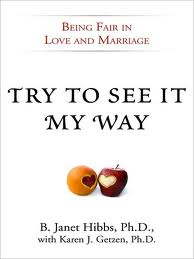Marriage
How Fair Is Your Marriage?
Nothing is more key to a couples' contentment than seeing their union as fair.
Posted February 28, 2014

What—or who—determines whether or not a marriage is fair? The simple, though perhaps surprising, answer is that finally it’s what any particular couple agrees on as fair. If they truly believe their relationship is equitable, then—for all intents and purposes—it is. And this would be the case regardless of how fair their arrangement might appear to anyone else. In many instances it’s the wife that bears the brunt of domestic (and sometime even financial) responsibilities. But still, if she’s genuinely okay about her marital “contract” (i.e., it feels fair to her), then despite others’ possibly seeing her as taken advantage of, problems of fairness won’t be an issue in the relationship.
Much of the time, however, partners’ subjective assessment of relational fairness is that it’s far from equitable: that the way chores, tasks, duties, and obligations are distributed—or how each of their core relational wants and needs are being addressed—aren’t fair at all. And when this is the situation, it’s almost guaranteed that the relationship will be in distress—marked by tension, frustration, passive-aggression, or endless (and futile) confrontation. For experiencing oneself as maritally “exploited” inevitably leads either to disillusioned feelings of anger and resentment or—conversely—regret, loneliness, and depression.
Either way, whether disgruntled or disheartened, the party (or parties) feeling abused will experience ever-increasing alienation from their mate, if not downright antagonism toward them. And this is why it’s so important for couples to be able to discuss openly—and with as much calmness and compassion as possible—how equitable or “just” each of them perceives the union.
Preliminary to such a heart-to-heart talk, it’s extremely useful to consider that what your parents thought was equitable may be what (through family conditioning) also feels fair to you. But what if their subjective standards for fairness differed substantially from those of your spouse’s family? And this is one reason that I’ve long felt that two words should always be appended to the term “fair”: namely, “to whom”?
Let’s explore, practically, how various discrepancies between you and your mate can detrimentally play out in your relationship:

Say that as a child you frequently felt lost, deprived, or hurt because of your parents’ inability, or unwillingness, to adequately address your core dependency needs. These needs might have included feeling that your caretakers were there to protect you; that you were listened, attended to, and acknowledged; held, soothed, and nurtured; emotionally supported and trusted; empathized with and validated; approved of and respected; and so on. Today, it’s possible your child self (or inner child) feels that they have every right to present their partner with the “way past due balance” in this (never closed) account. Although it’s rarely conscious, your subliminal script might go something like this: “If you really love me—as you professed so many times during our courtship—surely you’ll be willing to make up for everything my parents didn’t give me.”
However covertly or deviously, you hit your mate with a bill listing all your unfulfilled childhood needs. And in fact it may feel entirely “reasonable” to do so if during the wooing period your partner-to-be was uncannily (or rather, intuitively) able to meet virtually all of these needs. You might even somehow regard as only “fair” their putting these needs ahead of their own (as, assuredly, your parents never did). After all, to your still-needy inner child you’re clearly entitled to have somebody make up for earlier parental deprivations.
But in such scenarios it’s unlikely that your spouse will appreciate your viewpoint as anywhere as fair as you do. After all, it wasn’t they that parented you and left you feeling cheated. So by what right could you expect them to see as justified your insisting that they “pay up”—or somehow compensate you for what your parents didn’t give you earlier? And here it’s crucial to recognize that your partner‘s assumptions and expectations (based on their own neglected childhood needs) may be similarly biased.

Again returning to your childhood, how were you dealt with positively by your parents? If you were treated as super-special—as somehow worth getting, or entitled to, virtually everything you desired (what today is generally seen as “spoiled”)—you may have an overblown sense of what you “naturally” deserve in a relationship. And if, on the other hand, your parents were withholding toward you—routinely denying, and even disparaging, most of your wants and needs—you might (as opposed to demanding that your partner pay the cost for your earlier deprivations) actually be prompted to forfeit your democratic right to share power in your relationship.
Obviously, such surrender can hardly be helpful in healing old psychological wounds. If ancient feelings of non-deservingness prevent you from honoring your essential dependency needs, you won’t avail yourself of present-day opportunities to get them addressed: that is, through a loving, give-and-take, adult relationship. And if you unwittingly set yourself up to be denied by never standing up to your partner, you’re likely to end up despondent when you find yourself repeatedly getting the short end of the marital stick.
Also vital to consider here is modeling. If you took your behavioral cues from a deferential, subordinate parent, you too are likely to overly accommodate your mate. Or, if you modeled yourself after your dominant parent, odds are that you’ll be inclined to take advantage of—or be unfair to—your current-day partner. In either case, a relationship between equals (which most experts regard as the relationship ideal) will continue to elude you.
A balanced, reciprocal relationship shouldn’t require either of you to give up, give in, or sacrifice yourself for the other. Yet at the same time a mutually fulfilling relationship does depend on the recognition that both of you probably have needs never sufficiently attended to in childhood. Being able to explicitly talk about this—and as calm, rational, and concerned adults—maximizes the chance that the two of you will eventually find some equitable way to give each other what was missing from your much earlier “intimate” relationship. And if so, you’ll come to see both of your needs as equally worthy and valid.
It’s important to add here that this relational healing process, though it includes certain “negotiating” elements, shouldn’t feel as though the two of you are drawing up some sort of business contract. That approach simply doesn’t work in the context of a deeply personal relationship. Rather, the healing process should be experienced as a devoted act of love, affection, commitment, and caring.

If you can grasp not only that you may have a skewed idea of relational fairness but that your spouse may also have brought some questionable assumptions to the union, then you’re in a good position to discuss—compassionately—what may not be working for either one of you. Keep in mind that nobody’s really at fault here: Insensitive, maybe, but hardly malicious.
If you genuinely want to make beneficial changes in your relationship, this is no time to proclaim moral superiority, to declare yourself unequivocally right and your partner indisputably wrong (or wrongheaded). Comprehending that your different sense of what’s fair is logically grounded in your past history may help you avoid interminable arguments about the justness of your respective viewpoints. If the two of you can see that your conflict really isn’t a matter of who’s right at all but about understandable—and reasonable—disparities in your expectations, then you’ll be much better able to reconcile your differences in a way that will make your relationship far more satisfying than it may have been up till now.
Finally, consider that if your relational needs aren’t being met, it could be that your partner hasn’t yet figured them out—or just how important they are to you. For you may never have explicitly expressed them. And here your silence could relate to the fear of making yourself vulnerable to your spouse’s possible rejection. Or it could be that you’re not all that clear about your needs because your parents’ negative reaction to your voicing them in the past eventually drove you to repress them. Notwithstanding these contingencies, it will be almost impossible to experience your relationship as fulfilling if it leaves the child residing deep inside you feeling empty, still hungry for a nurturance your parents regularly failed to provide—and that you, now “parentally responsible” for this child self, haven’t been able to articulate to your mate.
There are few things more intimately tied to marital happiness than both parties’ being able to live in peaceful harmony, comfortably treating each other in a manner that both of them perceive as—well—“caringly fair.” And what, after all, could be more crucial to a relationship than a couples’ ability to lovingly cooperate and compromise to achieve such fairness? In the end, not love, nor chemistry, sex, or areas of similarity may be anywhere as predictive of your marriage’s success than that you both experience your union in the empathically fair way I’ve sought to describe.
So think about it. Even though such a dialogue may be hard to initiate, what could be more vital to your union than sitting down and beginning to work through any differences the two of you may have about the give and take in your daily interactions? Engaging in this process with an open mind—and heart—will surely facilitate new understandings and behaviors, which, in turn, should help both of you realize the lofty goal of being in a relationship that—mutually—feels just, equitable, and fair.

Note 1: Probably the most useful book on this subject is Try to See It My Way: Being Fair in Love and Marriage (2009) by B. Janet Hibbs. I highly recommend it.
Note 2: To review other, complementary pieces I’ve written for Psychology Today on committed relationships, you might wish to check out these links:
- "To Accommodate or Confront: The Key Relationship Question"
- "Can You Give Your Partner as Much Love as They Don't Deserve?",
- “One Marriage = Two Realities,”
- “Giving to Get vs. Griping to Get,”
- “How Rational Are ‘Rational’ Marriages?”,
- “Couples—Stop Fighting Over Money!”,
- “4 Essential Rules for Approaching Couples Conflict,”
- “Couples Agreeing to Disagree: What’s It Really About?”,
- “How to Optimize Your Relationship: The 70/70 Compromise,”
- “Stop Criticizing Your Mate—Re-Learning What You Once Knew,"
- “Criticism vs. Feedback—Which One Wins, Hands Down? (in two parts),” and
- “In Families, Blood May Be Thicker . . . But Skin is Thinner (Part 3 of “Why Criticism is So Hard to Take”).
Note 3: To have a look at articles I’ve done for PT generally—on a diverse range of topics—click here.
© 2014 Leon F. Seltzer, Ph.D. All Rights Reserved.
--- I invite you to join me on Facebook, as well as follow my psychological/philosophical musings on Twitter.




